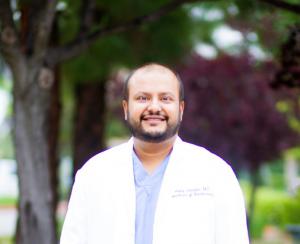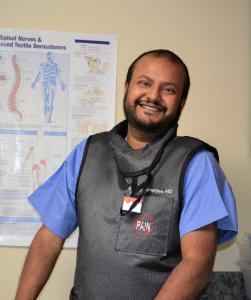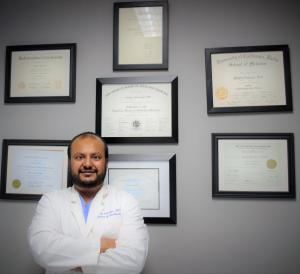In a new article, Dr. Sanjoy Banerjee provides an overview of abdominal pain management
“Abdominal pain” generally refers to pain that is felt anywhere from below your ribs to your pelvis. Dr. Sanjoy Banerjee explains in his new article.
Pacific Pain Care (N/A:N/A)
Dr. Sanjoy Banerjee, who focuses on Pain Management, shares his thoughts in a new article, which is available on his blog at https://sanjoybanerjeemd.home.blog/
Abdominal Pain Causes
There are many reasons why you may have pain in your abdomen. Patients often worry about issues such as appendicitis, gallstones, ulcers, infections and pregnancy. Abdominal Pain, however, may have surprising causes, such as heart issues, pneumonia, conditions in the pelvis or groin, skin rashes like shingles, and problems with stomach muscles like a strain. As indicated at the beginning, there are many potential causes for abdominal pain, and the intensity can range from a mild stomach ache to severe acute one. The many primary causes of abdominal pain include:
* Heartburn and indigestion
* Inflammation of the appendix
* Bowel blockage or obstruction
* Inflammation of the gallbladder
* Chronic constipation
* Food poisoning
* Inflammatory bowel disease (Crohn's disease or ulcerative colitis)
* Colic and Intussusception (common cause of abdominal pain in babies and infants)
* Menstrual cramps
* Irritable bowel syndrome (IBS)
* Ischemic bowel
* Kidney stones
* Lactose intolerance
* Pancreas issues
* Colon cancers
* Pancreatic cancers
* Ulcers
* Urinary tract infections
When to see a doctor
Some symptoms and indications require you to see a doctor immediately, such as:
* difficulty breathing
* severe pain
* pain lasting for several hours
* pain and/or vaginal bleeding if you are pregnant
* pain in your scrotum if you are a male
* pain and vomiting or shortness of breath
* pain and vomiting blood
* blood in your bowel motions or urine
* pain that spreads to your chest, neck or shoulder
Abdominal Pain Diagnosis
Abdominal pain is diagnosed by a range of procedures and tests, including:
The Doctor asking questions such as:
* Is the pain is limited to a specific area, or does it spread all over?
* What part of abdomen exactly is hurting?
* What is the intensity and frequency of the pain?
* Under what conditions is it worse or gets better?
* Any recent abdominal injury?
The doctor conducting particular tests, such as:
* rectal exam for hidden blood, or other problems
* if you are a man, the penis and scrotum exam
* if you are a woman, a pelvic exam of the uterus, fallopian tubes and ovaries, pregnancy test
* blood test to check for any infection (which causes a raised white cell count) or bleeding (which causes a low blood count or haemoglobin)
* other blood tests may check enzyme levels in the liver, pancreas and heart to pinpoint the organ at issue
* urine test to look for a urine infection or blood (for example, if kidney stone)
* an ECG to identify heart issues
* endoscopy exam (flexible tube with a light and video camera to examine some internal organs without the need for surgery)
* other tests, including x-ray, ultrasound or CT scan
A referral to another specialized doctor may be necessary to help find the exact cause of the problem.
At Home Treatments & Prevention
Most abdominal pain goes away without special treatment. In case you suffer pain, you can often be eased it by:
* Placing a hot water bottle on your abdomen.
* Soaking in a warm bath.
* Drinking plenty of clear fluids such as water.
* Reducing your consumption of coffee, tea and alcohol.
* Getting plenty of rest.
* Some over-the-counter antacids can reduce some types of pain.
* Mild painkillers such as paracetamol may work, but check for the recommended dose. Avoid aspirin or anti-inflammatory drugs, since they may aggravate the pain.
Yes, there are a few things you can do to prevent Abdominal Pain. Often a change in diet can help you relieve the pain and prevent it from happening in future:
* Avoid greasy foods
* Drink plenty of water
* Avoid eating too much with one meal, switch to small frequent meals
* Exercise regularly
* Include vegetables and fruits in your diet
Treatment
The treatments for Abdominal Pain depend on the exact cause, but may include the following:
* Medications for inflammation, GERD or ulcers, antibiotics for infections
* A strict diet plan to follow, including food that contains sufficient fiber little carbs
* In some cases, such as appendicitis and hernia, surgery will be the necessary.
About Dr. Sanjoy Banerjee, M.D., QME
Dr. Sanjoy Banerjee is the Founder and Medical Director of Pacific Pain Care in Wildomar and Corona, California. He graduated medical school from Imperial College, School of Medicine in London, England, and completed his Anesthesiology Residency at the University of Rochester, New York. In addition, Dr. Banerjee completed the ACGME accredited Pain Management Fellowship Program at the University of California at Davis.
References
Website: http://www.pacificpaincare.com/doctors
Blog: https://sanjoybanerjeemd.home.blog/
Blog of Pacific Pain Care: https://www.pacificpaincare.com/blog
News: https://medicogazette.com/dr-sanjoy-banerjee
News: https://hype.news/dr-sanjoy-banerjee/
News: https://hippocratesguild.com/dr-sanjoy-banerjee
LinkedIn: https://www.linkedin.com/in/sanjoy-banerjee-a57079186/
Doctor Profile: https://www.vitals.com/doctors/Dr_Sanjoy_Banerjee.html
Article on LinkedIn: https://www.linkedin.com/pulse/medical-doctor-dr-sanjoy-banerjee-starts-blog-pain-related-banerjee
Youtube: https://www.youtube.com/user/PacificPainCare
Facebook: https://www.facebook.com/Pacific-Pain-Care-1751511985128467/
Dr. Sanjoy Banerjee
Pacific Pain Care
+1 877-690-3748
email us here
Visit us on social media:
Facebook
LinkedIn
Pacific Pain Care, testimonials - Dr. Sanjoy Banerjee
Legal Disclaimer:
EIN Presswire provides this news content "as is" without warranty of any kind. We do not accept any responsibility or liability for the accuracy, content, images, videos, licenses, completeness, legality, or reliability of the information contained in this article. If you have any complaints or copyright issues related to this article, kindly contact the author above.





